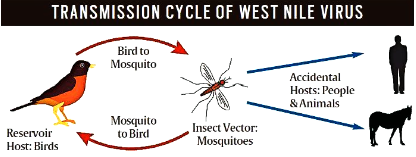TAG: GS-3: POLITY & SCIENCE AND TECHNOLOGY
THE CONTEXT: Ukraine has recently been battling a serious outbreak of West Nile virus (WNV), which has killed 11 people out of 88 cases reported since July 2024.
EXPLANATION:
Why in the news?
- According to health officials, Ukraine is facing a deadly West Nile virus (WNV) outbreak. Ukraine’s deputy health minister and chief sanitary doctor described the situation as serious, and officials expect the threat to persist.
- WNV, spread by the bite of infected mosquitoes, is common in Africa, the Middle East and Europe and tends to spike between June and September.
About West Nile virus:
- It is caused by the West Nile virus (WNV), a single-stranded RNA virus that is transmitted to humans through the bite of an infected mosquito (Mosquitoes of the genus Culexare generally considered the principal vectors of WNV) and Birds serve as reservoir hosts.
- It is a mosquito-borne, single-stranded RNA virus.
- It was first isolated in a woman in the West Nile district of Uganda in 1937.
- It is commonly found in Africa, Europe, the Middle East, North America and West Asia.
- According to the World Health Organization (WHO), it typically spikes between the summer and autumn months of June and September.
Transmission Cycle:
- Principal vector for transmission is the culex species of mosquitoes.
- Birds act as the reservoir host of the virus.
- Infected mosquitoes transmit WNV between and among humans and animals, including birds.
- When a mosquito feeds on infected birds, they become infected.
- The virus circulates in the blood of those infected mosquitoes for a few days, eventually getting into the mosquito’s salivary glands.

- The virus may get injected into humans and animals during later blood meals (when mosquito bites). Therein, WNV can multiply and possibly cause illness.
- WNV can also get transmitted from an infected mother to her child through blood transfusion or via exposure to the virus in laboratories.
- No instance of transmission by contact with infected humans or animals has been reported.
- It does not spread “through eating infected animals, including birds.
- Generally, the incubation period for WNV disease is 2-6 days. However, this may range from 2-14 days and can also be several weeks in people whose immunity is compromised.
- According to the World Health Organization (WHO), no human-to-human transmission of WNV through casual contact has been reported till date.
Symptoms:
- Infection with WNV is either asymptomatic (no symptoms) in around 80% of infected people or can lead to West Nile fever or severe West Nile disease.
- About 20% of people who become infected with WNV will develop West Nile fever and symptoms include fever, headache, and tiredness, and body aches, nausea, vomiting, occasionally with a skin rash.
- It may take several weeks or months to recover from severe illness.
- So far, 19 countries, including Albania, Austria, Bulgaria, Croatia, Cyprus, Czechia, France, Germany, Greece, Hungary, Italy, North Macedonia, Romania, Serbia, Slovakia, Slovenia, Spain and Türkiye and Kosovo have reported outbreaks.
Treatment:
- As of now, no treatment/vaccine for WNV is available.
- Only supportive treatments can be provided to neuroinvasive WNV patients.
Spread the Word




